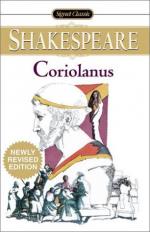|
This section contains 405 words (approx. 2 pages at 400 words per page) |

|
Coriolanus Summary & Study Guide Description
Coriolanus Summary & Study Guide includes comprehensive information and analysis to help you understand the book. This study guide contains the following sections:
This detailed literature summary also contains Further Study on Coriolanus by William Shakespeare.
Critics generally agree that Coriolanus was written in 1608, although a variety of composition dates ranging from 1605 to 1609 have been establ1shed as possible. The drama was first published in the First Folio of 1623, and this remains the only authoritative text. According to scholarly opinion this copy of the play was likely printed directly from a manuscript in Shakespeare's own handwriting with little editorial revision. The primary source for Coriolanus is the Greek historian Plutarch's "I.ife of Caius Marcus Coriolanus," included in his lives of the Noble Grecians and Romans. Shakespeare most likely read this work in Sir Thomas North's English translation. In fact, as critics have often noted, Coriolanus derives its characters, Its sequence of events, and even some of its language directly from North
As is true of Shakespeare's work in general, the dramatist took great liberties in altering the source material for Coriolanus. His most significant changes include his development of the character of Menenius Agrippa, who appears only briefly in the historical source; his expansion of Volumnia's role and influence over events in the actIon; his emphasis on the grain shortage as the cause of citizen riots in Rome, and, most Importantly, his complex portrayal of
Coriolanus, whose failure in Plutarch's biography is simply the result of a defective upbringing and education. Coriolanus has puzzled commentators throughout its critical history I.ike Its title character, who is the principal subject of the majority of critical discussion, the tragedy has been both admired and condemned. Generally, scholars have praised the work's lively characterization, and particularly the dramatic potency of the proud warn or's fall brought about by his rash behavior and personality. However, many early critics found the work marred by Shakespeare's harsh rhetoric, constricting Imagery, and presentation of an arrogant and unsympathetic hero.
The play is usually considered Shakespeare's final tragedy, but departs from the norm of the dramatist's tragic works in Its emphasis on politics. Indeed, the two most prominent modern lines of Critical thought concerning Coriolanus relate to its political nature, as a representation of class conflict between commoners (Roman plebeians) and aristocrats (patricians), and to Its psychological exploration of Its principal characters and their motivations-a subject often focused on the nature of Coriolanus's relationship with his mother, Volumnia. A third and related topic of critical interest considers the ethical dimension of the playas an examination of the Virtue of honor in both political and psychological contexts
Read more from the Study Guide
|
This section contains 405 words (approx. 2 pages at 400 words per page) |

|



